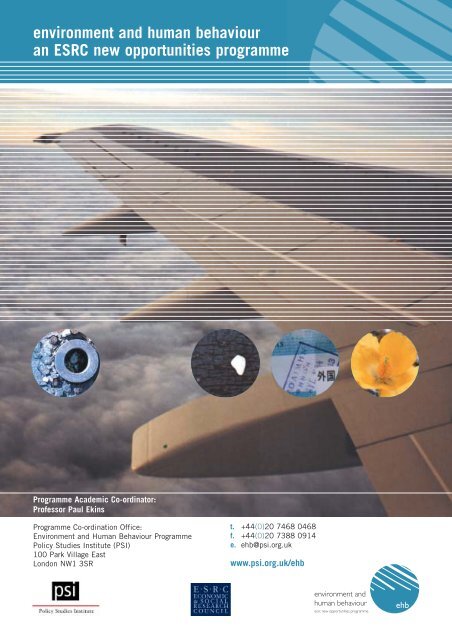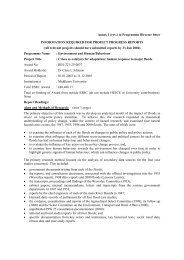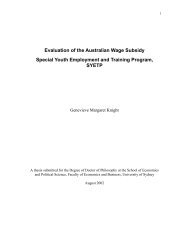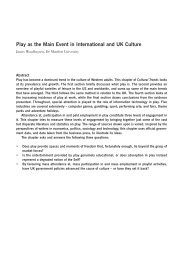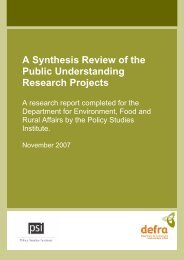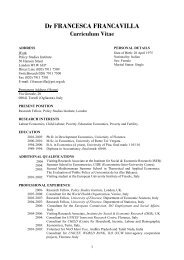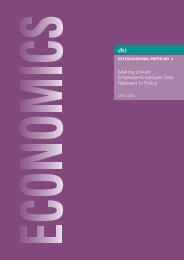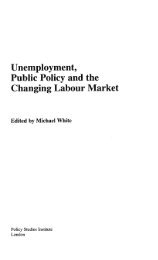environment and human behaviour an ESRC new opportunities ...
environment and human behaviour an ESRC new opportunities ...
environment and human behaviour an ESRC new opportunities ...
Create successful ePaper yourself
Turn your PDF publications into a flip-book with our unique Google optimized e-Paper software.
<strong>environment</strong> <strong><strong>an</strong>d</strong> <strong>hum<strong>an</strong></strong> <strong>behaviour</strong><br />
<strong>an</strong> <strong>ESRC</strong> <strong>new</strong> <strong>opportunities</strong> programme<br />
Programme Academic Co-ordinator:<br />
Professor Paul Ekins<br />
Programme Co-ordination Office:<br />
Environment <strong><strong>an</strong>d</strong> Hum<strong>an</strong> Behaviour Programme<br />
Policy Studies Institute (PSI)<br />
100 Park Village East<br />
London NW1 3SR<br />
t. +44(0)20 7468 0468<br />
f. +44(0)20 7388 0914<br />
e. ehb@psi.org.uk<br />
www.psi.org.uk/ehb
<strong>environment</strong> <strong><strong>an</strong>d</strong> <strong>hum<strong>an</strong></strong> <strong>behaviour</strong><br />
<strong>an</strong> <strong>ESRC</strong> <strong>new</strong> <strong>opportunities</strong> programme<br />
All the projects for this programme were commissioned<br />
in late 2002 <strong><strong>an</strong>d</strong> started their research by spring<br />
2003. The programme will run until about June 2004.<br />
The programme consists of fifteen projects, each of<br />
which lasts for about a year. This brochure gives a<br />
full list of the projects <strong><strong>an</strong>d</strong> contact details of the<br />
principal investigators. Summary descriptions of each<br />
project <strong><strong>an</strong>d</strong> researcher profiles are available on the<br />
programme website.<br />
It is crucial for the sound development of <strong>environment</strong>al<br />
policy that it is based on a good underst<strong><strong>an</strong>d</strong>ing of why<br />
people behave towards the <strong>environment</strong> as they do <strong><strong>an</strong>d</strong><br />
how these <strong>behaviour</strong>s might ch<strong>an</strong>ge. Both <strong>hum<strong>an</strong></strong><br />
<strong>behaviour</strong> <strong><strong>an</strong>d</strong> <strong>environment</strong>al ch<strong>an</strong>ge are formidably<br />
complex areas, <strong><strong>an</strong>d</strong> their combination compounds the<br />
complexity. Interdisciplinary research from a variety of<br />
theoretical perspectives is called for, covering a broad<br />
r<strong>an</strong>ge of <strong>environment</strong>al issues.<br />
The core objectives of the programme are to seek<br />
insights <strong><strong>an</strong>d</strong> avenues for further research, into the<br />
following questions:<br />
1. Why do people behave as they do towards the<br />
natural <strong>environment</strong>?<br />
2. How do or will people seek to adapt their<br />
<strong>behaviour</strong> in response to <strong>environment</strong>al ch<strong>an</strong>ge,<br />
especially rapid <strong>environment</strong>al ch<strong>an</strong>ge?<br />
3. What public policy approaches might persuade<br />
people to ch<strong>an</strong>ge their <strong>behaviour</strong>, either to<br />
mitigate the extent of negative <strong>environment</strong>al<br />
ch<strong>an</strong>ge, or to adapt to it in ways that do not<br />
exacerbate it, <strong><strong>an</strong>d</strong> to ch<strong>an</strong>ge their <strong>behaviour</strong> in<br />
ways that are least costly for society as a whole?<br />
In addition to the subst<strong>an</strong>tive outputs from each<br />
project, the programme will increase underst<strong><strong>an</strong>d</strong>ing of<br />
the area as a whole <strong><strong>an</strong>d</strong> produce advice <strong><strong>an</strong>d</strong><br />
recommendations to the <strong>ESRC</strong> on how it should take<br />
this research area forward.
<strong>environment</strong> <strong><strong>an</strong>d</strong> <strong>hum<strong>an</strong></strong> <strong>behaviour</strong><br />
<strong>an</strong> <strong>ESRC</strong> <strong>new</strong> <strong>opportunities</strong> programme<br />
Projects (listed by research area)<br />
Rapid climate ch<strong>an</strong>ge<br />
Exploring vulnerability to rapid climate ch<strong>an</strong>ge in Europe<br />
This project seeks to assess the sensitivity <strong><strong>an</strong>d</strong> vulnerability to<br />
rapid climate ch<strong>an</strong>ge of different parts of society <strong><strong>an</strong>d</strong> the economy,<br />
<strong><strong>an</strong>d</strong> to explore how society might seek to adapt to it.<br />
Professor Nigel Arnell<br />
Department of Geography <strong><strong>an</strong>d</strong> Tyndall Centre for Climate<br />
Ch<strong>an</strong>ge Research<br />
University of Southampton, Highfield, Southampton, SO17 1BJ<br />
n.w.arnell@soton.ac.uk<br />
Crises as catalysts for adaptation: <strong>hum<strong>an</strong></strong> responses to major<br />
floods<br />
This project will assess the influence of four major flood events,<br />
<strong><strong>an</strong>d</strong> their socio-economic, cultural <strong><strong>an</strong>d</strong> political contexts, on public<br />
policy, <strong><strong>an</strong>d</strong> the mech<strong>an</strong>isms that were used to effect ch<strong>an</strong>ge in<br />
public policy <strong><strong>an</strong>d</strong> <strong>hum<strong>an</strong></strong> <strong>behaviour</strong>.<br />
Dr Clare Johnson<br />
Flood Hazard Research Centre, School of Health <strong><strong>an</strong>d</strong> Social<br />
Science,<br />
Middlesex University, Queensway, Enfield, EN3 4SF<br />
C.Johnson@mdx.ac.uk<br />
Rapid climate ch<strong>an</strong>ge in the UK: towards <strong>an</strong> institutional theory<br />
of adaptation<br />
This project will seek to identify the key elements of org<strong>an</strong>isational<br />
structure <strong><strong>an</strong>d</strong> m<strong>an</strong>agement that could facilitate adaptation to<br />
rapid <strong>environment</strong>al ch<strong>an</strong>ge, <strong><strong>an</strong>d</strong> synthesise these into a theoretical<br />
framework for examining org<strong>an</strong>isations’ adaptive potential in<br />
these circumst<strong>an</strong>ces.<br />
Dr Mark Pelling<br />
Department of Geography,<br />
University of Liverpool, Liverpool L60 7TZ<br />
pelling@liv.ac.uk<br />
Predicting thresholds of social <strong>behaviour</strong>al responses to rapid<br />
climate ch<strong>an</strong>ge<br />
The project will seek to underst<strong><strong>an</strong>d</strong> how individuals conceive of<br />
‘rapid’ climate ch<strong>an</strong>ge, whether thresholds of ch<strong>an</strong>ge are<br />
import<strong>an</strong>t to them, <strong><strong>an</strong>d</strong> how difference in social context <strong><strong>an</strong>d</strong><br />
background might affect individuals’ responses to it.<br />
Professor Judith Petts<br />
Centre for Environmental Research <strong><strong>an</strong>d</strong> Training<br />
University of Birmingham, Edgbaston, Birmingham B15 2TT<br />
j.i.petts@bham.ac.uk<br />
Global <strong>environment</strong>al ch<strong>an</strong>ge <strong><strong>an</strong>d</strong> food systems<br />
Integrating social vulnerability into research on food systems <strong><strong>an</strong>d</strong><br />
global ch<strong>an</strong>ge<br />
By exploring <strong><strong>an</strong>d</strong> synthesising different <strong>an</strong>alytical perspectives,<br />
the project aims to enh<strong>an</strong>ce underst<strong><strong>an</strong>d</strong>ing of how concepts of<br />
vulnerability of social aspects of food systems to global<br />
<strong>environment</strong>al ch<strong>an</strong>ge c<strong>an</strong> be integrated with vulnerability<br />
concepts from natural science.<br />
John Ingram<br />
NERC Centre for Ecology <strong><strong>an</strong>d</strong> Hydrology, Wallingford,<br />
OX10 8BB<br />
jsii@ceh.ac.uk<br />
Sustainable mobility<br />
Taxation futures for sustainable mobility<br />
This project will use a scenario approach to explore possible<br />
tr<strong>an</strong>sport taxation regimes that would be effective in ch<strong>an</strong>ging<br />
tr<strong>an</strong>sport <strong>behaviour</strong> while maintaining government revenues.<br />
Dr Stephen Potter<br />
Department of Design <strong><strong>an</strong>d</strong> Innovation<br />
The Open University, Walton Hall, Milton Keynes MK7 6AA<br />
s.potter@open.ac.uk<br />
Urb<strong>an</strong> systems <strong><strong>an</strong>d</strong> long-term climate ch<strong>an</strong>ge<br />
Future comforts: re-conditioning urb<strong>an</strong> <strong>environment</strong>s<br />
This project examines social conceptions of thermal comfort in<br />
the indoor <strong>environment</strong>, showing how these have become<br />
established, <strong><strong>an</strong>d</strong> how more sustainable interpretations might<br />
take root in future.<br />
Dr Elizabeth Shove<br />
Department of Sociology, Cartmel College<br />
L<strong>an</strong>caster University, L<strong>an</strong>caster LA1 4YL<br />
e.shove@l<strong>an</strong>caster.ac.uk<br />
Tourism <strong><strong>an</strong>d</strong> the <strong>environment</strong><br />
Indigenous peoples, <strong>environment</strong>al ch<strong>an</strong>ge <strong><strong>an</strong>d</strong> tourism in<br />
extreme <strong>environment</strong>s<br />
The project will explore a r<strong>an</strong>ge of issues associated with<br />
<strong>environment</strong>al ch<strong>an</strong>ge, traditional (indigenous) cultures <strong><strong>an</strong>d</strong><br />
tourism development in extreme <strong>environment</strong>s, including these<br />
cultures’ socio-cultural perceptions of the <strong>environment</strong> <strong><strong>an</strong>d</strong> the<br />
negative <strong>environment</strong>al <strong><strong>an</strong>d</strong> social consequences of this being<br />
ignored in the development of tourism.<br />
Dr J Keen<strong>an</strong><br />
School of Development Studies/Overseas Development Group<br />
University of East Anglia<br />
Norwich NR7 4TJ<br />
Email jeremykeen<strong>an</strong>@hotmail.com
<strong>environment</strong> <strong><strong>an</strong>d</strong> <strong>hum<strong>an</strong></strong> <strong>behaviour</strong><br />
<strong>an</strong> <strong>ESRC</strong> <strong>new</strong> <strong>opportunities</strong> programme<br />
Natural capital<br />
Natural capital: metaphor, learning <strong><strong>an</strong>d</strong> <strong>hum<strong>an</strong></strong> <strong>behaviour</strong><br />
The idea of natural capital has become <strong>an</strong> import<strong>an</strong>t component<br />
of the sustainable development discourse, emphasising the<br />
productivity of natural systems <strong><strong>an</strong>d</strong> allowing this to be compared<br />
with that of other forms of capital. But understood as a metaphor,<br />
it may also be useful for learning both about natural systems <strong><strong>an</strong>d</strong><br />
about the various roles played by such discourses in representing<br />
them. The project will explore the implications of this for<br />
education, theory <strong><strong>an</strong>d</strong> policy related to sustainability.<br />
Professor Robin Grove-White<br />
Institute for Environment, Philosophy <strong><strong>an</strong>d</strong> Public Policy,<br />
L<strong>an</strong>caster University, L<strong>an</strong>caster LA1 4YG<br />
r.grove-white@l<strong>an</strong>caster.ac.uk<br />
Other research areas<br />
Listening to children: <strong>environment</strong>al perspectives<br />
<strong><strong>an</strong>d</strong> the school curriculum<br />
This project will seek to underst<strong><strong>an</strong>d</strong> how children in a relatively<br />
deprived urb<strong>an</strong> setting underst<strong><strong>an</strong>d</strong> their <strong>environment</strong>, <strong><strong>an</strong>d</strong> how<br />
the relev<strong>an</strong>ce of the school curriculum to these experiences,<br />
<strong><strong>an</strong>d</strong> the children’s <strong>environment</strong>al activism, c<strong>an</strong> be increased in a<br />
participatory way.<br />
Dr Robert Barratt<br />
Department of Education<br />
Keele University, Keele University Staffordshire ST5 5BG<br />
eda21@educ.keele.ac.uk<br />
Tilting at windmills? The attitude-<strong>behaviour</strong> gap in re<strong>new</strong>able<br />
energy conflicts<br />
This project will explore the complex <strong>hum<strong>an</strong></strong> attitudes <strong><strong>an</strong>d</strong><br />
<strong>behaviour</strong> in respect of proposed re<strong>new</strong>able energy developments,<br />
particularly wind farms, thereby deepening underst<strong><strong>an</strong>d</strong>ing between<br />
these attitudes <strong><strong>an</strong>d</strong> <strong>behaviour</strong>, <strong><strong>an</strong>d</strong> <strong>hum<strong>an</strong></strong> values <strong><strong>an</strong>d</strong> re<strong>new</strong>able<br />
technologies, which may be used to inform policy making.<br />
Dr John F Benson<br />
L<strong><strong>an</strong>d</strong>scape Research Group, School of Architecture, Pl<strong>an</strong>ning &<br />
L<strong><strong>an</strong>d</strong>scape, University of Newcastle, Newcastle upon Tyne<br />
NE1 7RU<br />
j.f.benson@ncl.ac.uk<br />
UK small firms <strong><strong>an</strong>d</strong> their response to <strong>environment</strong>al pressures<br />
This project will explore small firms’ <strong>environment</strong> m<strong>an</strong>agement<br />
practices <strong><strong>an</strong>d</strong> their attitudes <strong><strong>an</strong>d</strong> responses to <strong>environment</strong>al<br />
regulation. It will set this in the context of ecological<br />
modernisation theory <strong><strong>an</strong>d</strong> the results will generate policy-relev<strong>an</strong>t<br />
insights into small firms’ <strong>environment</strong>al <strong>behaviour</strong>.<br />
Professor Robert Blackburn<br />
The Small Business Research Centre, Kingston University<br />
Kingston Hill, Kingston Upon Thames, Surrey KT2 7LB<br />
r.blackburn@kingston.ac.uk<br />
Middle class <strong>environment</strong>al values in India: <strong>an</strong> interdisciplinary<br />
dialogue<br />
This project will explore the <strong>environment</strong>al values of India’s sizeable<br />
middle classes, with reference especially to their dynamism,<br />
complexity <strong><strong>an</strong>d</strong> influence in relation to various <strong>environment</strong>al<br />
issues <strong><strong>an</strong>d</strong> threats.<br />
Dr Emma Mawdsley<br />
Department of Geography,<br />
Durham University, Science Laboratories, South Road,<br />
Durham DH1 3LE<br />
e.e.mawdesley@durham.ac.uk<br />
Appraisal, institutional learning <strong><strong>an</strong>d</strong> sustainability: defining a <strong>new</strong><br />
agenda<br />
This project will explore the role of appraisal in the political<br />
process, <strong><strong>an</strong>d</strong> the ways in which it may help to modify the beliefs,<br />
values <strong><strong>an</strong>d</strong> <strong>behaviour</strong> of individuals <strong><strong>an</strong>d</strong> org<strong>an</strong>isations, with a<br />
view to developing a <strong>new</strong> theoretical framework for appraisal,<br />
<strong><strong>an</strong>d</strong> appraisal practice that is better informed by social science.<br />
Dr Sus<strong>an</strong> Owens<br />
Newnham College,<br />
University of Cambridge, Cambridge CB3 9DF<br />
sus<strong>an</strong>.owens@geog.cam.ac.uk<br />
Environmental issues <strong><strong>an</strong>d</strong> <strong>hum<strong>an</strong></strong> <strong>behaviour</strong> in low-income areas<br />
of the UK<br />
Focusing on low-income communities, this project will examine:<br />
the relationship between <strong>hum<strong>an</strong></strong> <strong>behaviour</strong> <strong><strong>an</strong>d</strong> <strong>environment</strong>al<br />
issues; links between locally relev<strong>an</strong>t <strong>environment</strong>al issues,<br />
community action, <strong><strong>an</strong>d</strong> wider sustainable development concerns;<br />
<strong><strong>an</strong>d</strong> the potential lessons for policy to support positive social <strong><strong>an</strong>d</strong><br />
<strong>environment</strong>al ch<strong>an</strong>ge.<br />
Professor Anne Power<br />
Department of Social Policy <strong><strong>an</strong>d</strong> Centre for the Analysis of Social<br />
Exclusion, London School of Economics, Houghton St,<br />
London WC2A 2AE<br />
<strong>an</strong>ne.power@lse.ac.uk<br />
further details of each of these projects c<strong>an</strong> be found at<br />
www.psi.org.uk/ehb<br />
printed on Revive matt art 170gsm made from 75% de-inked post-consumer waste paper


